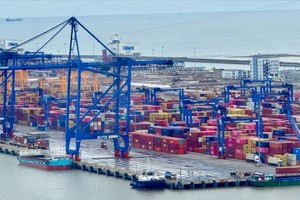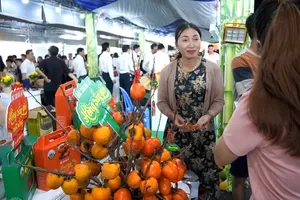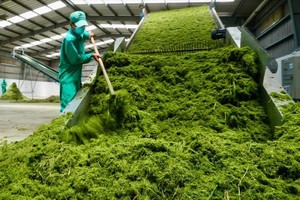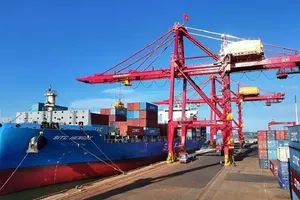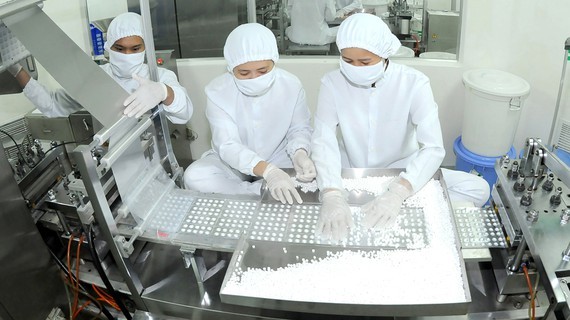
Mr. Ralf Matthaes, Executive Director of Infocus Mekong Research, said that he has been in Vietnam for 26 years and he has never seen the economic outlook so badly affected like this, even during the period from 2010 to 2011 when the real estate bubble burst. The survey by Infocus Mekong Research conducted on 242 enterprises showed that 20 percent of enterprises affirmed better development prospects; 25 percent said that they can keep the same growth as last year; meanwhile, the situation will be worse for 55 percent of enterprises.
The main reasons were slumps in the source of raw materials imported from China and higher expenses. At Dien Quang Lamp Joint Stock Company, the raw materials are only enough to maintain production until the end of the first quarter of this year. As the pandemic might last for a long time, the company has had a backup plan, looking for alternative sources of raw materials from many other markets. However, because the prices of raw materials rose by 5-10 percent, or even up to 20 percent in some markets, the cost prices of its products as well as its production plan will be seriously affected.
The production index of some industrial industries, including crude oil and natural gas exploitation, engine-driven vehicle manufacturing, electrical device manufacturing, beverage, and garments dropped by 0.9-8.6 percent. although some main industrial products did not decrease, their increases were lower than in the same period last year. Just a few products managed to keep a high growth of 25.5-28.9 percent, including cell phone components, steel bars, corner steel, and cell phones.
In the past two months, the reason that enterprises in various fields still managed to keep the growth momentum as the input raw materials imported at the end of last year were still in stock. From March, keeping the growth momentum will be more difficult as the source of raw materials is exhausted while the alternative sources of raw materials remain limited. Trade activities between many countries will also be sluggish, or even interrupted as the blockade is extended to prevent the spread of the disease.
However, not all industries are equally affected. Tourism, hotels, retail, catering manufacturing, and logistics are currently the most affected industries. Many entertaining places, retail chains, and diners have had to close or shrink their business to lessen the pressure of premises rental costs. The survey also showed that operating efficiency has declined by 20-50 percent, depending on the economic sector and geographic location. Revenues fell by 13.48 percent compared to the same period last year.
The Ministry of Industry and Trade has worked with enterprises to promote searching for the supply of raw materials in many markets. Ministries and agencies are coordinating to quickly remove bottlenecks in cargo transport activities, trade connections, electronic payment, specialized inspection, and customs clearance. Credit institutions have accelerated activities of debt rescheduling, charge-off, and reducing interest rates for enterprises. The Government also made strong moves when issuing seven measures to support businesses, especially, the credit package of about VND250 trillion to support affected enterprises. The Government also requested relevant agencies not to increase prices increases in the first and second quarters for items that are input raw materials for production of enterprises whose prices are set by the State. In order to share common difficulties, many retail networks have reduced the slotting fee and premises rental for enterprises.
Economic experts said that the effort from many sides will partly reduce the burden for enterprises. However, it is essential to control the source of domestically-produced raw materials. Accordingly, they will prioritize the raw materials for domestic enterprises instead of focusing on export. As for manufacturing enterprises, besides the effort to promote export, this is also an opportunity to develop the domestic market share. Enterprises just need to maintain production steadily to overcome the current difficult situation, they will have strong growth momentum as soon as the disease is controlled.
The main reasons were slumps in the source of raw materials imported from China and higher expenses. At Dien Quang Lamp Joint Stock Company, the raw materials are only enough to maintain production until the end of the first quarter of this year. As the pandemic might last for a long time, the company has had a backup plan, looking for alternative sources of raw materials from many other markets. However, because the prices of raw materials rose by 5-10 percent, or even up to 20 percent in some markets, the cost prices of its products as well as its production plan will be seriously affected.
The production index of some industrial industries, including crude oil and natural gas exploitation, engine-driven vehicle manufacturing, electrical device manufacturing, beverage, and garments dropped by 0.9-8.6 percent. although some main industrial products did not decrease, their increases were lower than in the same period last year. Just a few products managed to keep a high growth of 25.5-28.9 percent, including cell phone components, steel bars, corner steel, and cell phones.
In the past two months, the reason that enterprises in various fields still managed to keep the growth momentum as the input raw materials imported at the end of last year were still in stock. From March, keeping the growth momentum will be more difficult as the source of raw materials is exhausted while the alternative sources of raw materials remain limited. Trade activities between many countries will also be sluggish, or even interrupted as the blockade is extended to prevent the spread of the disease.
However, not all industries are equally affected. Tourism, hotels, retail, catering manufacturing, and logistics are currently the most affected industries. Many entertaining places, retail chains, and diners have had to close or shrink their business to lessen the pressure of premises rental costs. The survey also showed that operating efficiency has declined by 20-50 percent, depending on the economic sector and geographic location. Revenues fell by 13.48 percent compared to the same period last year.
The Ministry of Industry and Trade has worked with enterprises to promote searching for the supply of raw materials in many markets. Ministries and agencies are coordinating to quickly remove bottlenecks in cargo transport activities, trade connections, electronic payment, specialized inspection, and customs clearance. Credit institutions have accelerated activities of debt rescheduling, charge-off, and reducing interest rates for enterprises. The Government also made strong moves when issuing seven measures to support businesses, especially, the credit package of about VND250 trillion to support affected enterprises. The Government also requested relevant agencies not to increase prices increases in the first and second quarters for items that are input raw materials for production of enterprises whose prices are set by the State. In order to share common difficulties, many retail networks have reduced the slotting fee and premises rental for enterprises.
Economic experts said that the effort from many sides will partly reduce the burden for enterprises. However, it is essential to control the source of domestically-produced raw materials. Accordingly, they will prioritize the raw materials for domestic enterprises instead of focusing on export. As for manufacturing enterprises, besides the effort to promote export, this is also an opportunity to develop the domestic market share. Enterprises just need to maintain production steadily to overcome the current difficult situation, they will have strong growth momentum as soon as the disease is controlled.

